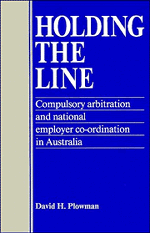Book contents
- Frontmatter
- Contents
- List of tables and figures
- List of abbreviations
- Acknowledgements
- Introduction
- Dedication
- 1 Industrial legislation and the rise of permanent employer associations 1890–1906
- 2 The Higgins era 1907–1920
- 3 Rival shops 1921–1929
- 4 Depression and recovery 1930–1939
- 5 War and government executive action 1940–1949
- 6 Consolidation 1950–1959
- 7 The National Employers' Associations 1960–1972
- 8 Confederation 1973–1988
- 9 Models of national employer co-ordination
- Appendices
- Bibliography
- Records of organisations
- Index
4 - Depression and recovery 1930–1939
Published online by Cambridge University Press: 05 November 2011
- Frontmatter
- Contents
- List of tables and figures
- List of abbreviations
- Acknowledgements
- Introduction
- Dedication
- 1 Industrial legislation and the rise of permanent employer associations 1890–1906
- 2 The Higgins era 1907–1920
- 3 Rival shops 1921–1929
- 4 Depression and recovery 1930–1939
- 5 War and government executive action 1940–1949
- 6 Consolidation 1950–1959
- 7 The National Employers' Associations 1960–1972
- 8 Confederation 1973–1988
- 9 Models of national employer co-ordination
- Appendices
- Bibliography
- Records of organisations
- Index
Summary
The previous chapter reviewed CCEA developments during the 1920s. It also reviewed the emergence of national employer co-ordination machinery during the decade. The Committee of Control re Basic Wage and Working Hours was brought into being in response to the test-case environment that had been made possible by amendments to the Conciliation and Arbitration Act in 1921.
This chapter reviews the developments of the 1930s, years in which economic conditions dominated the political and industrial relations climate. The Great Depression was accompanied by a Labor administration, industrial legislation perceived as hostile to employers' interests, calls for piece-work and the abandonment of compulsory arbitration, and test cases to reduce the ‘sacrosanct’ and ‘irreducible’ basic wage.
The rapid economic recovery following 1934 led to a period in which employers were chagrined by the industrial legislative inactivity by non- Labor Governments, in which unions mounted test cases to restore the basic wage and reduce standard hours of work, in which the economy was progressively placed on a wartime footing, and in which employer associations abandoned their traditional hostility towards compulsory arbitration and became actively supportive of the tribunal system.
The economic developments are reviewed in the first part of this chapter. The second part examines CCEA developments that were dominated by a major schism over the question of industrial uniformity. This schism had the potential to destroy the CCEA.
- Type
- Chapter
- Information
- Holding the LineCompulsory Arbitration and National Employer Co-ordination in Australia, pp. 75 - 99Publisher: Cambridge University PressPrint publication year: 1989

